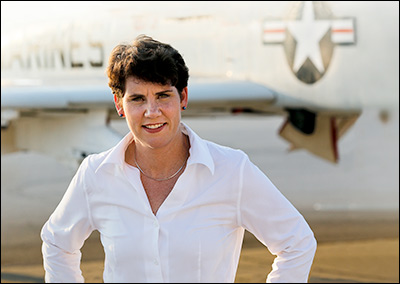
Kentucky challenger Amy McGrath (D) is the surprise top Senate fundraiser for Q3.
Oct. 22, 2019 — The campaign financial disclosure reports are now published and, as usual, the Daily Kos Elections site has compiled a cumulative activity summary. The list of top fundraisers includes some familiar names, but also features a few newcomers.
The top Senate fundraiser is a surprise, as Kentucky challenger Amy McGrath (D) attracted more than $10.7 million in the quarter, over $7 million of which came in small-dollar unitemized contributions. She is opposing Senate Majority Leader Mitch McConnell (R), which explains why she has attracted such a large amount of national activist money.
As they have for the entire cycle, Arizona candidates Mark Kelly (D) and appointed Sen. Martha McSally (R) again posted impressive combined quarter fundraising figures.
Kelly, a retired astronaut and husband of former Rep. Gabrielle Giffords (D-Tucson), raised over $5 million more for the quarter taking his election cycle total to almost $14 million. Sen. McSally is close behind. She pulled in just over $3 million for the quarter and has accumulated approximately $8.3 million since the campaign began. These numbers are more in line with a big state Senate race, making them extraordinary for an Arizona political contest, a state that has only nine congressional districts.
The Senate candidates breaking the $3 million barrier for the quarter are Sens. Lindsey Graham (R-SC; $3.24 million in the 3rd Quarter, $12.9 million for the election cycle), Maine challenger Sara Gideon (D; $3.18 million; $4.2 million), John Cornyn (R-TX; $3.11 million, $13.5 million), and Michigan challenger John James (R; $3.1 million, $4.7 million).
Those banking over $2 million for the past 12 weeks are, Sens. Gary Peters (D-MI; $2.48 million for the 3rd Quarter, $9.2 million for the election cycle), Cory Gardner (R-CO; $2.42 million, $9.1 million), Mitch McConnell (R-KY; $2.24 million, $13.4 million), Jeanne Shaheen (R-NH; $2.23 million, $7.3 million), South Carolina challenger Jamie Harrison ($2.21 million, $4.0 million), Sen. Susan Collins (R-ME) and Colorado challenger John Hickenlooper (D) both with $2.12 million, and Alabama Sen. Doug Jones (D; $2.01 million, $5.7 million). Sen. Collins has raised $8.6 million for the election cycle and Hickenlooper, $2.1 million for a Senate campaign that began in September.






